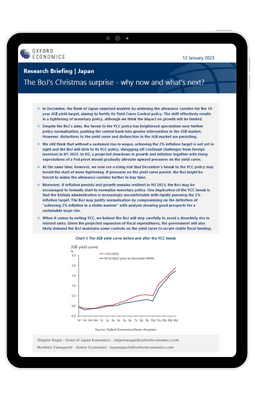The BoJ’s Christmas surprise – why now and what’s next?
In December, the Bank of Japan surprised markets by widening the allowance corridor for the 10-year JGB yield target, aiming to fortify its Yield Curve Control policy. The shift effectively results in a tightening of monetary policy, although we think the impact on growth will be limited.

What you will learn:
- Despite the BoJ’s aims, the tweak to the YCC policy has heightened speculation over further policy normalisation, pushing the central bank into greater intervention in the JGB market. However, distortions to the yield curve and dysfunction in the JGB market are persisting.
- We still think that without a sustained rise in wages, achieving the 2% inflation target is not yet in sight and the BoJ will stick to its YCC policy, shrugging off continual challenges from foreign investors in H1 2023. In H2, a projected slowdown in growth and inflation together with rising expectations of a Fed pivot should gradually alleviate upward pressures on the yield curve.
- At the same time, however, we now see a rising risk that December’s tweak to the YCC policy may herald the start of more tightening. If pressures on the yield curve persist, the BoJ might be forced to widen the allowance corridor further to buy time.
Tags:
Related Resouces

Post
Surprisingly strong wage data ends NIRP and YCC in Japan
The Bank of Japan (BoJ) decided to end its negative interest rates policy and set the target band for the overnight market rate at 0%-0.1% at Tuesday's meeting, earlier than our call for April.
Find Out More
Post
Will Japan policy adjustments accompany the end of NIRP?
Markets appear to be increasingly converging with our forecast that the Bank of Japan will abolish its negative interest rate policy at the April meeting, but views diverge on whether any other policy adjustments will accompany the end of NIRP.
Find Out More
Post
No change in policy as BoJ waits for wage data
The Bank of Japan left both short-term and long-term policy rates unchanged at Tuesday's meeting. Amid a decline in global yields, pressures on the Yield Curve Control (YCC) policy framework from bond and foreign exchange rate markets have eased.
Find Out More